Donate to or Fund Kota Kita
Kota Kita carries out commissioned work, but it also relies heavily on donations and funding.
Some of Kota Kita’s most meaningful work, including its landmark project Solo Kota Kita, has been funded by aid and philanthropic organizations like the Ford Foundation, USAID, and UN-Habitat..
To make a one-off donation, or set up regular donations, please enter your details below. Feel free to contact Kota Kita to discuss how else you can help.
Volunteer or Intern
Participation is the spirit of Kota Kita’s work, and more than 14 volunteers and interns have contributed to building better cities, while learning the ropes of inclusive urban planning and governance.
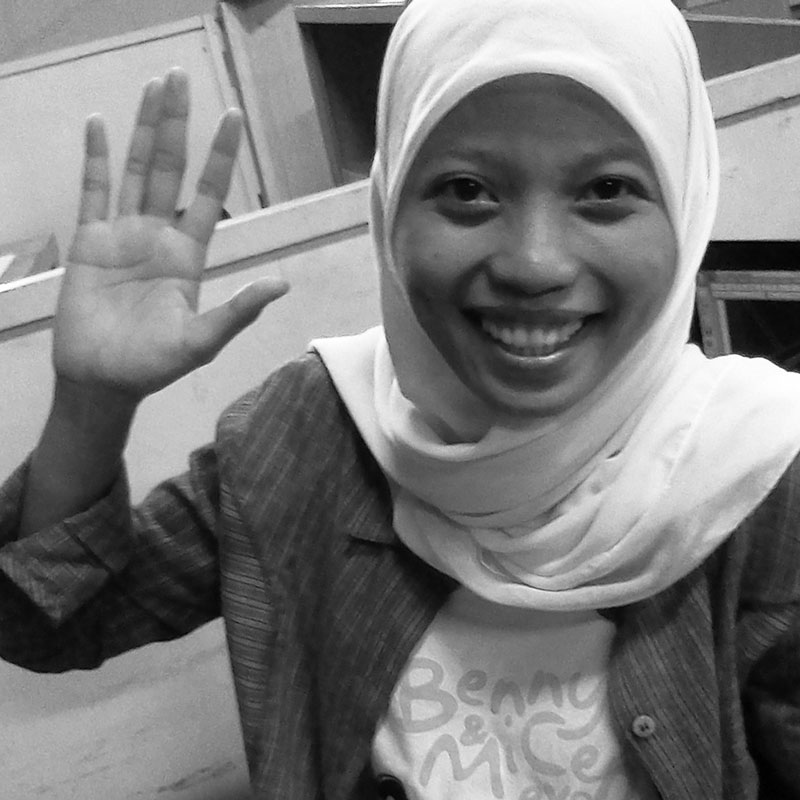
Addina Amalia
Addina Amalia
2011 & 2012
 Addina Amalia remembers the excitement of winning the URBAN SOS design competition with other Kota Kita interns in 2011 with their Firm Foundation project entry. "When I was with Kota Kita, I got to work on almost everything, especially on urban design, taking projects from beginning to end, which was a great experience," she says.
Addina Amalia remembers the excitement of winning the URBAN SOS design competition with other Kota Kita interns in 2011 with their Firm Foundation project entry. "When I was with Kota Kita, I got to work on almost everything, especially on urban design, taking projects from beginning to end, which was a great experience," she says.
Addina is now working as a junior architect in the capital, Jakarta. At Kota Kita, she enjoyed being in the field to survey community members. She helped collect data from stakeholders and governments, and became a pro at drawing up maps and other designs.
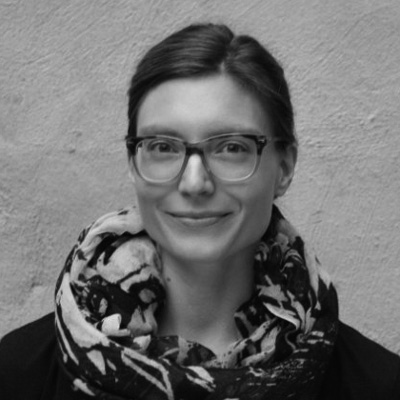
Alice Shay
Alice Shay
2011 & 2012
 Alice interned with Kota Kita while studying for her Master of City Planning at the Massachusetts Institute of Technology (MIT), and in 2012 she worked on the Firm Foundation project with Kota Kita, using her skills to engage residents of a dense riverbank settlement in Banjarmasin city to create much a needed public space.
Alice interned with Kota Kita while studying for her Master of City Planning at the Massachusetts Institute of Technology (MIT), and in 2012 she worked on the Firm Foundation project with Kota Kita, using her skills to engage residents of a dense riverbank settlement in Banjarmasin city to create much a needed public space.
Alice now works for Bloomberg Associates in New York City as part of their urban planning team, providing philanthropic consulting to city governments around the world. Alice has fond memories of making site visits in Indonesia for the City Development Strategies program, commissioned by UNHABITAT, to assess neighborhoods’ conditions, livelihood dynamics and infrastructure. “I also found visiting Banjarmasin's floating market at dawn an incredible experience,” she said.

Alex Warburton
Alex Warburton
2014-2015
 Alex is interning with Kota Kita in Solo, where he is also studying the intricate art of gamelan, a traditional Javanese music, on a government scholarship. Yet what he finds challenging is dealing with the dramatic wet season. "Coming back from my first meeting at the Kota Kita office was also my first time driving in a rainy season downpour, without a raincoat to boot. I definitely remember that. The sky seemed fine to my eyes, but two minutes later, it just opened up," he says.
Alex is interning with Kota Kita in Solo, where he is also studying the intricate art of gamelan, a traditional Javanese music, on a government scholarship. Yet what he finds challenging is dealing with the dramatic wet season. "Coming back from my first meeting at the Kota Kita office was also my first time driving in a rainy season downpour, without a raincoat to boot. I definitely remember that. The sky seemed fine to my eyes, but two minutes later, it just opened up," he says.
Alex is currently researching and summarizing Kota Kita's past projects for the organization's website, to make the valuable work of Kota Kita more accessible to diverse audiences. He plans to do a PhD in linguistic anthropology.
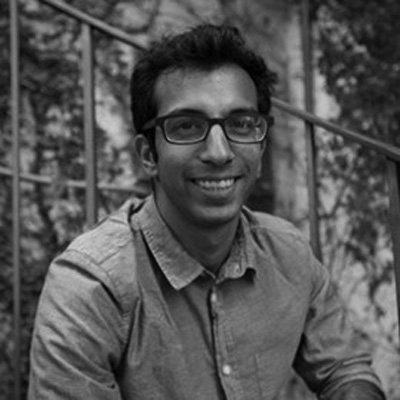
Alykhan Mohamed
Alykhan Mohamed
Summer 2012
 Alykhan interned with Kota Kita while studying for a Master of Urban Planning degree at Harvard University. He worked on piloting SMS surveys for the SMS Rapid Urban Response in Solo, crowd-sourcing neighborhood data using cell phones, and helped organize and facilitate workshops for the Firm Foundation project in Banjarmasin.
Alykhan interned with Kota Kita while studying for a Master of Urban Planning degree at Harvard University. He worked on piloting SMS surveys for the SMS Rapid Urban Response in Solo, crowd-sourcing neighborhood data using cell phones, and helped organize and facilitate workshops for the Firm Foundation project in Banjarmasin.
Alykhan now works as an urban planner and designer in the city of Austin, Texas. He said of all the experiences he had with Kota Kita, the three-day Firm Foundation workshops were his favorite “because of the learning experience I had during the meticulous and thorough process of planning and preparing for the workshop.”
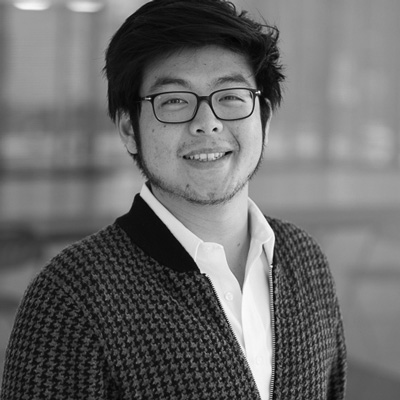
Barry Beagen
Barry Beagen
2010
 Barry interned with Kota Kita while completing his undergraduate studies at Cornell. He worked on developing the Solo Kota Kita maps and mini-atlases for the city’s 51 neighborhoods. He is currently completing his Master of Architecture at MIT, and as a fellow at the Tata Center for Technology and Design, he is developing research and a pilot project for the delivery of incremental affordable housing in India.
Barry interned with Kota Kita while completing his undergraduate studies at Cornell. He worked on developing the Solo Kota Kita maps and mini-atlases for the city’s 51 neighborhoods. He is currently completing his Master of Architecture at MIT, and as a fellow at the Tata Center for Technology and Design, he is developing research and a pilot project for the delivery of incremental affordable housing in India.
He felt the best experience he had during his internship was the combination of neighborhood surveys and developing maps simultaneously. “And also working late into the evening and sharing moped rides to catch a meal at Spesial Sambal,” he said, referring to a famous restaurant that Kota Kita staff regularly frequent which serves as many types of fresh chili sauce you can imagine.

Daniel Heriberto Palencia Arreola
Daniel Heriberto Palencia Arreola
2014
 Daniel interned with Kota Kita after graduating from the Unversidad Nacional Automa de Mexico. He helped create a database in Solo for the musrenbang, an annual community-level participatory budgeting process, so that residents could make decisions about their city based on data and evidence. Daniel now works in Singapore with Urban Launchpad and the Singapore-MIT Alliance for Research and Technology (SMART) on different projects revolving around urban planning and technology.
Daniel interned with Kota Kita after graduating from the Unversidad Nacional Automa de Mexico. He helped create a database in Solo for the musrenbang, an annual community-level participatory budgeting process, so that residents could make decisions about their city based on data and evidence. Daniel now works in Singapore with Urban Launchpad and the Singapore-MIT Alliance for Research and Technology (SMART) on different projects revolving around urban planning and technology.
Daniel continues to collaborate with Kota Kita, developing a digital database to map infrastructure projects in Solo. Daniel was heartened by the welcoming environment in Indonesia and at Kota Kita. “I really enjoyed my experience there. I was glad to learn about the government, culture and society of Indonesia, and to be able to see their similarities and differences with Mexico. I'm still impressed with how far and close those two places can be at the same time.”

Emily Schlickman
Emily Schlickman
2011
 Emily contributed to Kota Kita as a landscape architecture graduate from Harvard University. She worked on developing maps and mini atlases to support the participatory planning in the city, and contributed to an assessment of climate change vulnerability in the Pabean district in Pekalongan city, a hub for the production of batik, Indonesia’s famous hand-dyed artisanal fabric.
Emily contributed to Kota Kita as a landscape architecture graduate from Harvard University. She worked on developing maps and mini atlases to support the participatory planning in the city, and contributed to an assessment of climate change vulnerability in the Pabean district in Pekalongan city, a hub for the production of batik, Indonesia’s famous hand-dyed artisanal fabric.
Emily now lives in San Francisco and works for SWA Group, a landscape architecture and urban design firm, while teaching digital representation courses. She enjoyed visiting and surveying the neighborhoods of Solo. “This qualitative perspective always seemed to shed new light on our analysis and allowed us to connect faces with data,” she said.

Emily Lesk
Emily Lesk
2009
 Emily interned while studying her Master of Architecture at Harvard University. She worked on the Solo Kota Kita community mapping project, helping to create maps and mini atlases that illustrate living conditions in Solo’s neighborhoods, including access to public services, income levels and child school attendance rates. She also researched the process of making batik, Indonesia’s celebrated hand-dyed textile, in a Solo neighborhood.
Emily interned while studying her Master of Architecture at Harvard University. She worked on the Solo Kota Kita community mapping project, helping to create maps and mini atlases that illustrate living conditions in Solo’s neighborhoods, including access to public services, income levels and child school attendance rates. She also researched the process of making batik, Indonesia’s celebrated hand-dyed textile, in a Solo neighborhood.
Emily now works for the city of San Francisco, facilitating real estate development projects that also aid economic development. “My favorite experience interning in Indonesia was riding my first becak (rickshaw) around the neighborhood of Kratonan to gather information for the mini atlas,” Emily said, referring to the historical area that once included the sultanate’s palace.
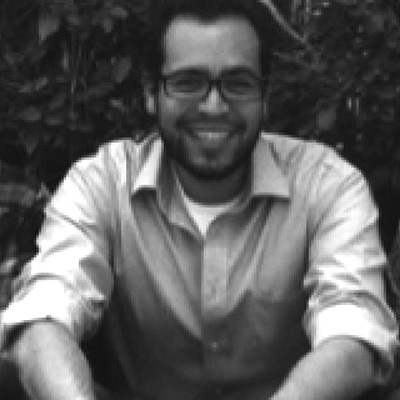
Hector Salazar Salome
Hector Salazar Salome
2011-2012
 Hector interned for a full year with Kota Kita as a Luce Scholar after he graduated from MIT with a Master of City Planning degree. He worked on an extensive review of the musrenbang process in Solo.
Hector interned for a full year with Kota Kita as a Luce Scholar after he graduated from MIT with a Master of City Planning degree. He worked on an extensive review of the musrenbang process in Solo.
He is now in Jakarta serving as the Executive Director of J-PAL SEA, a research organization that conducts policy impact evaluations throughout the region. “I really enjoyed collaborating with a dedicated team that was committed to their community and driven by the belief that development is enhanced by participation,” Hector said.
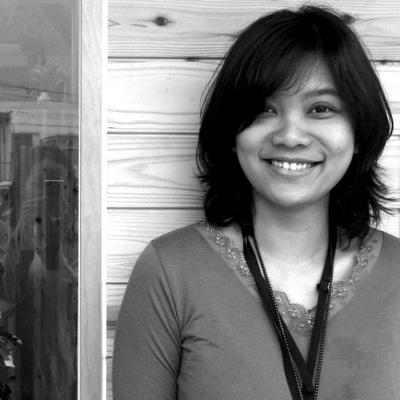
Heni Wijaya
Heni Wijaya
2012
 Heni interned with Kota Kita for three months, getting involved in several projects in Solo as well as Banjarmasin on Borneo island. In Solo, she worked on developing tools and a mapping methodology to improve the potential for tourism in the Sondakan subdistrict of Solo. She also had a chance to see the site of the Firm Foundation project, and join the early meetings with local government officials.
Heni interned with Kota Kita for three months, getting involved in several projects in Solo as well as Banjarmasin on Borneo island. In Solo, she worked on developing tools and a mapping methodology to improve the potential for tourism in the Sondakan subdistrict of Solo. She also had a chance to see the site of the Firm Foundation project, and join the early meetings with local government officials.
Heni is now working as a designer for IKEA in Japan. “During my internship, I enjoyed waking up really early in the morning to take a boat so we could see the traditional floating morning market in Banjarmasin. All the traders were women and they drove their small boats so professionally!” Heni said.
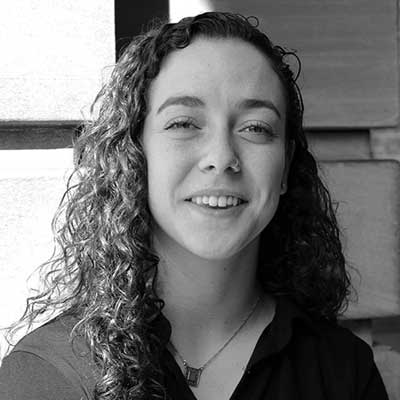
Hadar Sachs
Hadar Sachs
Summer 2015
 Hadar Sachs is originally from San Francisco but she joined us from Ithaca, New York State, where she is studying for her undergraduate degree in Urban Studies at Cornell University.
Hadar Sachs is originally from San Francisco but she joined us from Ithaca, New York State, where she is studying for her undergraduate degree in Urban Studies at Cornell University.
During her two months in Solo, she helped the creation of the Urban Citizenship Academy, testing and improving the curriculum together with our team. Her responsibilities, including giving training and guidance to volunteer groups, mentor them, and develop their projects and advocacy tools. She was impressed by the power of the mini atlases in changing the way citizens engage with their government. Hadar brought extensive experience in community planning, having worked with towns in the United States, and has also been studying Bahasa Indonesia; she had a good time practicing it in the real life setting of Solo.
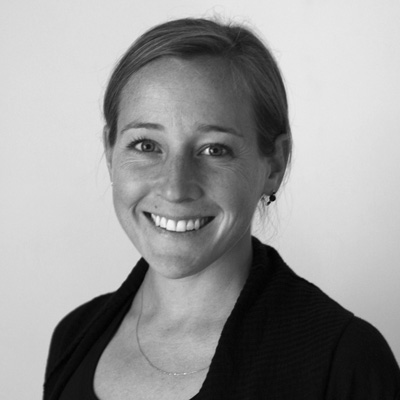
Karina Gilbert
Karina Gilbert
Summer 2013
 Karina joined Kota Kita’s efforts in the capital, Jakarta, and in collaboration with the NGO Ciliwung Merdeka, she and colleague Christina Geros used mapping techniques and participatory fieldwork to assess the impact that the Ciliwung River normalization would have on two local communities.
Karina joined Kota Kita’s efforts in the capital, Jakarta, and in collaboration with the NGO Ciliwung Merdeka, she and colleague Christina Geros used mapping techniques and participatory fieldwork to assess the impact that the Ciliwung River normalization would have on two local communities.
Karina has since completed her Master of Architecture in Urban Design program at the Harvard Graduate School of Design and is determined to put people at the center of city making. “In addition to experiencing the softer side of Jakarta in one of its many kampungs, the experience I most enjoyed was breaking the Ramadan fast with new friends,” Karina said.

Lucia Artavia
Lucia Artavia
Summer 2015
 Lucia Artavia is a Masters student in City and Regional Planning program at University of Pennsylvania, with a concentration in Sustainable Transportation and Infrastructure. She is from Costa Rica and her interests are in equity and accessibility to mobility opportunities and the impact of land use and the built environment on travel behavior.
Lucia Artavia is a Masters student in City and Regional Planning program at University of Pennsylvania, with a concentration in Sustainable Transportation and Infrastructure. She is from Costa Rica and her interests are in equity and accessibility to mobility opportunities and the impact of land use and the built environment on travel behavior.
During the summer 2015 in Solo, she conducted research about women’s cycling in Solo, and createed and implemented a number of tools and implementing strategies that raise awareness of cycling for women. She conducted focus group discussions with different groups including schoolgirl cyclists, Department of Transportation, Surakarta City, and bicycle groups, like Bike2Work and Seli Solo Raya (local’s folding bike community). From her research, she created programs that target and promote access to cycling for women. Additionally, conducted fieldwork and research about the acceptance of electric bicycles as an alternative for a more environmentally sustainable mode of transportation.

Olivia Stinson
Olivia Stinson
2010
 Olivia volunteered on the Solo Kota Kita project, helping to put together the maps and mini atlases, and to upload them onto a website for the community to access and use. She helped with the enormous task of editing and refining the maps before they went online. Olivia went to Haiti after her time in Indonesia to help with the earthquake reconstruction efforts and returned to her home country, the United States, to work on long-term recovery following a major flood disaster in Colorado.
Olivia volunteered on the Solo Kota Kita project, helping to put together the maps and mini atlases, and to upload them onto a website for the community to access and use. She helped with the enormous task of editing and refining the maps before they went online. Olivia went to Haiti after her time in Indonesia to help with the earthquake reconstruction efforts and returned to her home country, the United States, to work on long-term recovery following a major flood disaster in Colorado.
She is now the Recovery Specialist for Planning with the Colorado Division of Homeland Security and Emergency Management, working with two towns on their community-driven recovery plan after the 2013 floods, and a number of other mitigation and recovery planning projects across Colorado. She said she was excited to see Kota Kita grow in Indonesia. “The first data set Kota Kita started to develop was so basic, but it was so crucial,” Olivia said. “There weren't a lot of good maps or data sets for Solo, so doing any informed and substantiated planning or analysis would have been difficult without them. I loved being in Solo at the first Kota Kita office as well as getting to know that lovely city and spending time with the team eating sambal and bebek goreng! (fresh chili sauce and fried duck!)”
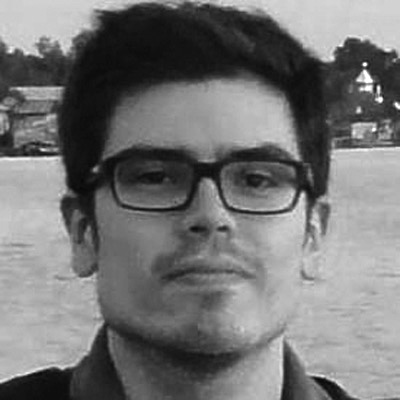
Sebastian Dettman
Sebastian Dettman
2012
 Sebastian spent a week assisting Kota Kita while completing his Master of Southeast Asia Studies at the University of Michigan. He helped evaluate Kota Kita’s own work on the musrenbang, the participatory budget planning process in Solo, and assisted in interviewing local community facilitators about their role in supporting the process.
Sebastian spent a week assisting Kota Kita while completing his Master of Southeast Asia Studies at the University of Michigan. He helped evaluate Kota Kita’s own work on the musrenbang, the participatory budget planning process in Solo, and assisted in interviewing local community facilitators about their role in supporting the process.
Sebastian is now a third-year PhD student in the Government Department at Cornell University researching local politics in Indonesia. “In my short time with Kota Kita, I was deeply impressed by how extensively connected the organization was with local community leaders around the city. I most enjoyed seeing these interactions while accompanying Kota Kita staff, as well as hearing firsthand the perceptions of local leaders on the planning process,” Sebastian said.

Stephen Kennedy
Stephen Kennedy
2011 & 2012
 Stephen joined Kota Kita while studying for a Master of City Planning at MIT. He worked on the City Development Strategies program, aimed at developing strategic planning documents for city leaders to help them communicate their visions to national-level planning agencies. While with Kota Kita, he also worked on an international student urban design competition called Urban SOS, developing the winning entry, Firm Foundation.
Stephen joined Kota Kita while studying for a Master of City Planning at MIT. He worked on the City Development Strategies program, aimed at developing strategic planning documents for city leaders to help them communicate their visions to national-level planning agencies. While with Kota Kita, he also worked on an international student urban design competition called Urban SOS, developing the winning entry, Firm Foundation.
Now in San Francisco, Stephen is a Design & Technology Fellow for the Consumer Financial Protection Bureau, and continues to contribute to Kota Kita, having designed this very website. “My favorite experience in Indonesia was probably the daily boat commutes on the Martapura river for field work and community meetings in riverfront neighborhoods,” Stephen said.
The Urban Social Forum
If you want to take part in the 4th Urban Social Forum in December 2016, please contact us.
The Urban Social Forum is an annual event that creates an open and inclusive space for civil society organizations, students, academics and social leaders from all over Indonesia to gather.
The forum provides an opportunity for participants to debate ideas, exchange experiences and knowledge, and meet and network with other leaders and organizations working on pressing urban issues throughout the country.
The event is aimed at promoting awareness of urban issues, improving understanding of current practices and promoting collaboration.
Together, the civil society community can develop a common vision about how to overcome the challenges that determine our urban future.
The Urban Social Forum organizers believe that inclusive, participatory and progressive policies are necessary for the development of socially just, sustainable and humane cities, and that the role of civil society is critical in developing solutions to our urban problems.
Not only are these socially inclusive cities needed, we believe they are achievable, and it is our responsibility to promote them.